College tie-ins allow more to join Michigan robotics craze
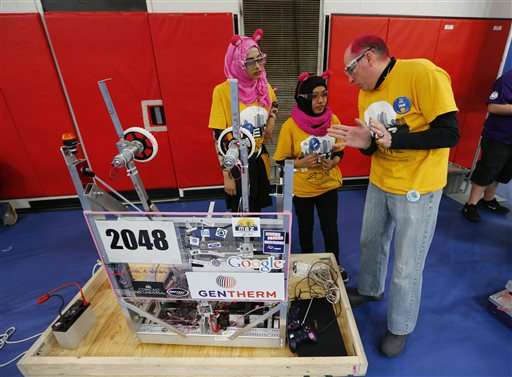
An increasing number of students from Michigan's most financially strapped urban school districts, including Detroit and Flint, are joining robotics teams because local universities are making space and materials available at no charge.
The University of Michigan started the trend with its Michigan Engineering Zone. The 5,200-square-foot facility in Detroit, filled with two computer labs, a machine shop, robot testing area and collaborative workstations, hosts 18 teams from city schools. Many of them wouldn't otherwise be able to participate in the FIRST robotics contest.
Michigan has more high school teams competing in the annual competition than any other state. But participants and advisers say that beyond the contest, the teams further students' interest in learning about related topics and keep them engaged in school.
"Michigan Engineering Zone is the greatest thing I've ever been to," said Papia Aziz, the captain of a team known as the Pink Panthers from the Detroit International Academy for Young Women.
Aziz, a 16-year-old junior who wants to be a pediatrician, credits the MEZ, as it is commonly known, with furthering her interest in STEM, or science, technology, engineering and math. She said she enjoys "figuring out ways to solve a problem" and the fun of competing.
Competitions are nice, but success at them is not the ultimate goal, says Gail Alpert, the president of FIRST in Michigan.
"They think they're doing robotics. They have no idea that the robot is just the vehicle to excite them about STEM," Alpert said, adding that nearly every student who competes in FIRST robotics graduates from high school.
Of the 42 seniors who spent time at the MEZ during last school year, 38 went on to higher education, while four joined the military. Either way, they all graduated. That compares with 2014 graduation rates of 78 percent for the state and 71 percent for Detroit Public Schools.
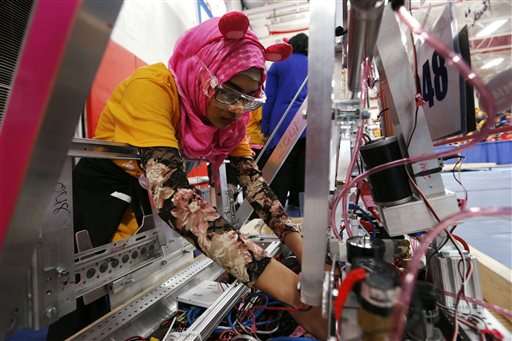
"It's almost a miracle if you think about," said Jeanne Murabito, a University of Michigan College of Engineering official who helped create the MEZ six years ago.
It's not just the tools and space that make the MEZ what it is. It's also the people, Murabito said.
Each team has access to professional engineers as well as faculty, staff and students from the University of Michigan.
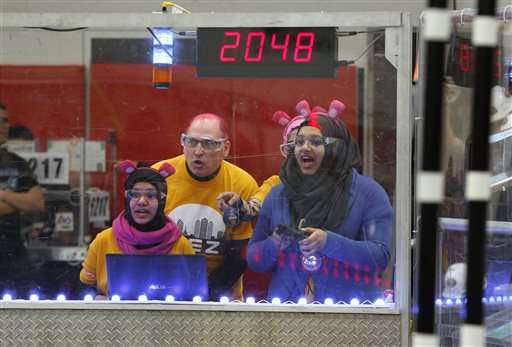
The same is true at Flint's Kettering University, home to the recently opened FIRST Robotics Community Center. Unlike the MEZ, though, which is 40 miles from Ann Arbor, Kettering's facility is on the school's campus, meaning that faculty, staff and students who serve as team mentors don't have far to travel.
While Kettering's robotics hub is just getting going, the MEZ has been around long enough that it has reached capacity. In fact, the MEZ was forced to turn away teams this year, said Murabito, who is looking for additional funding opportunities to expand the space.
"It's like an infection," said Julian Pate, a retired Ford Motor Co. executive who runs the MEZ. "They're bitten, and it doesn't go away."
-
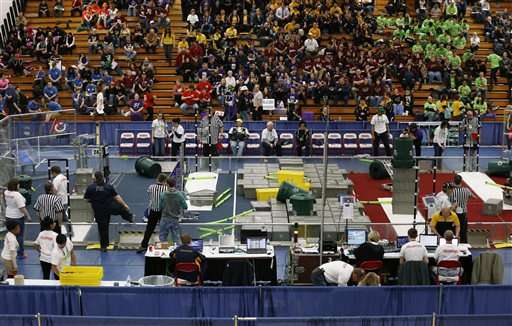
In this March 27, 2015 photo, teams compete during the For Inspiration and Recognition of Science and Technology, FIRST, Robotics district competition in Livonia, Mich. Michigan has more high school teams competing in the annual contest than any other state. (AP Photo/Paul Sancya) -
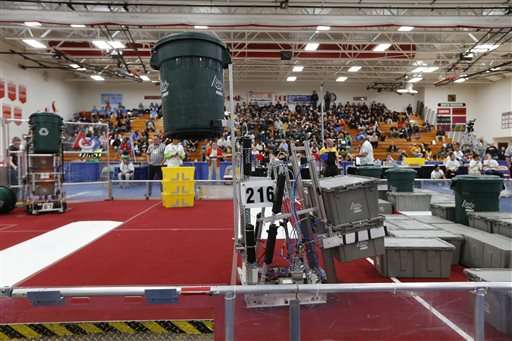
In this March 27, 2015 photo, a robot competes during the For Inspiration and Recognition of Science and Technology, FIRST, Robotics district competition in Livonia, Mich. Michigan has more high school teams competing in the annual contest than any other state. (AP Photo/Paul Sancya)
More information: The MEZ: mez.engin.umich.edu
FIRST Robotics: www.usfirst.org
© 2015 The Associated Press. All rights reserved.



















